We have extraordinary fish potential."Jakarta (ANTARA News) - The Indonesian people today, November 21, observed the Second Anniversary of their National Fishery Day (Harkannas) with the spirit of increasing fish consumption and protein intake in efforts to keep their body healthy.
Since last year, the Indonesian people already have the slogan: Eat Fish for Building Intelligence, Health, and Strength. The growth of brain cells is supported by protein, which comes from different sources such as fish as fish contains Omega3 for brain growth.
Indonesia is rich in fish resources. About 70 percent of Indonesias 5.2 million-square-kilometer area is covered by water and has abundant fish stocks. Yet it has not yet fully sustainably exploited its sea wealth and its fish consumption is still low.
After all, the government under the Ministry of Marine Affairs and Fisheries (KKP) has categorically been successful in combating fish theft in Indonesian waters, leading to an increase in the countrys fish stocks.
"We have extraordinary fish potential," Nilanto Perbowo, director general for reinforcement of the competitiveness of marine and fisheries products of the KKP, said during the commemoration of the second anniversary of the National Fishery Day (Harkannas) in Jakarta Saturday. He said the volume of fish has increased after the success of the KKP to fight against illegal, unreported and unregistered (IUU) fishing in the country.
With the increase in the countrys fish potential, the people, with the spirit of the commemoration of the Harkannas this year, have been called on to increase their fish consumption. Moreover, the levels of fish consumption of the people are not the same.
Director General Nilanto said the groups which have high fish consumption levels reside in the coastal areas. People who have settled in rural areas far from littoral regions usually have low fish consumption.
With the spirit of Harkannas this year, the director general advised the people to consume more fish instead of other types of meat such as beef and chicken.
"We want to encourage people to eat more fish so that the per capita fish consumption of the people this year could reach 40 kilograms (kg)," Nilanto Perbowo said.
Based on the KKP data, the national per capita fish consumption of the Indonesian people is still about 35 kg, but there are provinces where per capita consumption is more, he said. People in some regions have a consumption level of 38 kg per annum.
The aim of the government behind commemorating the Harkannas is to publicize the fish eating campaign among the public and to encourage them to eat fish, Nilanto said.
Eating more fish could create a healthier body because fish meat contains proteins which are badly needed, for example, by expectant mothers and children.
"The government, in this case the KKP, will continue to encourage people to consume fish so that it becomes one of the main food items in the daily lives of people," Nilanto noted.
The per capita fish consumption of about 38 kg is much smaller as compared to the average fish consumption of the Japanese, which reaches 50 kg.
Indonesias per capita fish consumption has, in fact, increased as compared to 29.08 kg in 2009 and 30.47 kg per annum in 2010.
Director General for Processing and Marketing of Fisheries Products of the KKP Saut Hutagalung affirmed last year that about 65 percent of the peoples protein needs could be supplied by fish. Meeting nutritional needs is a serious problem, which is apparent by the fact that the average height of the people in the Southeast Asian Nations (ASEAN) is 174 centimeters while that in Indonesia is only about 158 centimeters.
The average IQ level of the ASEAN people is 93 while that of Indonesia is only 89. Saut remarked that this problem must be overcome, and the situation should be improved by increasing fish consumption.
"We are concerned about increasing fish consumption among people. Fish has more advantages as compared to other types of meat," Saut noted.
No form of disease has been found in fish meat that could endanger the health of consumers. Other types of meat may contain diseases.
"In beef, we know of what is called mad cow disease, and we also find bird flu in fowls. But, in fish, except for fat, we do not find any dangerous diseases. The fat content in fish does not pose a significant problem. Fish is classified in the white group of meat, which has a positive impact on health," the KKP official explained.
Therefore, the director general called on the people to promote and eat more fish. The people should increase fish production both through culture and fish-catching endeavors.
"Yet, the people should continue to maintain the environment," Saut had affirmed during the commemoration of the Fish Day in Jambi in November last year.
Therefore, this year the KKP reaffirmed its call to the people to make eating fish a habit in their daily lives.
After all, fish stocks are now adequate at home. Indonesia does not need to import fish as the countrys production is sufficient to meet its domestic requirement, including the needs of its industry and people.
"What it might need to import is certain types of fish of good quality that are difficult to obtain in Indonesia in order to meet the demand of hotels," observer Mahmud Hasan of North Malukus Muhammadiyah University said.
Increasing domestic production of fishing companies or traditional fishermen is a solution for the problem facing the fishery industry, which has so far faced a shortage of raw materials. "There is no longer any need for imports," Mahmud said.***1***
(A014/INE/H-YH)
(T.A014/A/BESSR/A/Yosep) 21-11-2015 17:
(T.A014/A/KR-BSR/A014) 21-11-2015 17:41:08
Reporter: Andi Abdussalam
Editor: Priyambodo RH
Copyright © ANTARA 2015












